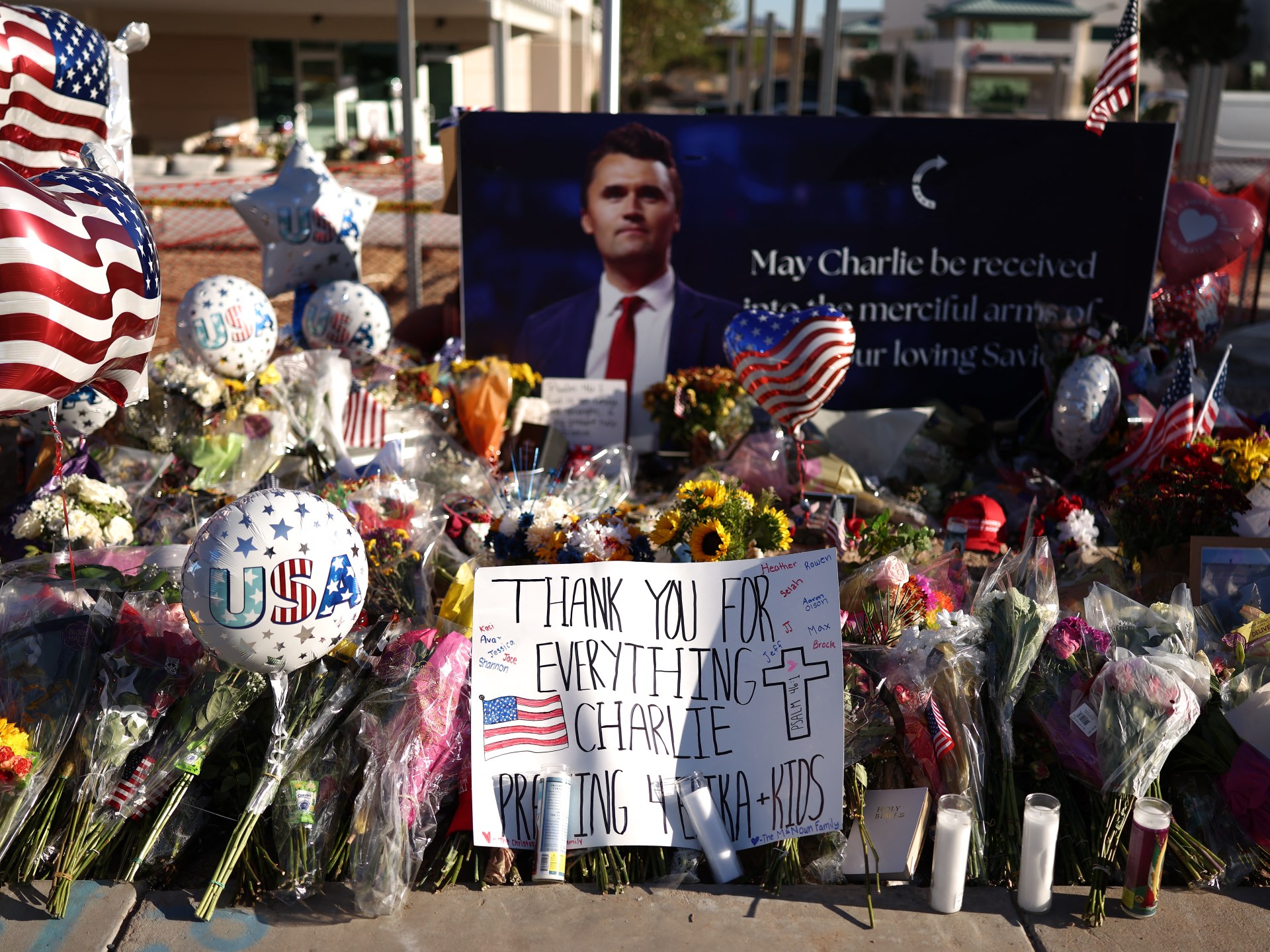Empathy is the only way forward after Charlie Kirk’s death
It wasn’t the greeting I was expecting from my dad when I stopped by for lunch Wednesday at his Anaheim home.
“¿Quién es Charlie Kirk?”
Papi still has a flip phone, so he hasn’t sunk into an endless stream of YouTube and podcasts like some of his friends. His sources of news are Univisión and the top-of-the-hour bulletins on Mexican oldies stations — far away from Kirk’s conservative supernova.
“Some political activist,” I replied. “Why?”
“The news said he got shot.”
Papi kept watering his roses while I went on my laptop to learn more. My stomach churned and my heart sank as graphic videos of Kirk taking a bullet in the neck while speaking to students at Utah Valley University peppered my social media feeds. What made me even sicker was that everyone online already thought they knew who did it, even though law enforcement hadn’t identified a suspect.
Conservatives blamed liberalism for demonizing one of their heroes and vowed vengeance. Some progressives argued that Kirk had it coming because of his long history of incendiary statements against issues including affirmative action, trans people and Islam. Both sides predicted an escalation in political violence in the wake of Kirk’s killing — fueled by the other side against innocents, of course.
It was the internet at its worst, so I closed my laptop and checked on my dad. He had moved on to cleaning the pool.
“So who was he?” Papi asked again. By then, Donald Trump had announced Kirk’s death. Text messages streamed in from my colleagues. I gave my dad a brief sketch of Kirk’s life, and he frowned when I said the commentator had supported Trump’s mass deportation dreams.
Hate wasn’t on Papi’s mind, however.
“It’s sad that he got killed,” Papi said. “May God bless him and his family.”
“Are politics going to get worse now?” he added.
It’s a question that friends and family have been asking me ever since Kirk’s assassination. I’m the political animal in their circles, the one who bores everyone at parties as I yap about Trump and Gov. Gavin Newsom while they want to talk Dodgers and Raiders. They’re too focused on raising families and trying to prosper in these hard times to post a hot take on social media about political personalities they barely know.
They’ve long been over this nation’s partisan divide, because they work and play just fine with people they don’t agree with. They’re tired of being told to loathe someone over ideological differences or blindly worship a person or a cause because it’s supposedly in their best interests. They might not have heard of Kirk before his assassination, but they now worry about what’s next — because a killing this prominent is usually a precursor of worse times ahead.
I wasn’t naive enough to think that the killing of someone as divisive as Kirk would bring Americans together to denounce political terrorism and forge a kinder nation. I knew that each side would embarrass itself with terrible takes and that Trump wouldn’t even pretend to be a unifier.
But the collective dumpster fire we got was worse than I had imagined.
President Donald Trump shakes hands with moderator Charlie Kirk, during a Generation Next White House forum at the Eisenhower Executive Office Building on the White House complex in Washington, Thursday, March 22, 2018.
(Manuel Balce Ceneta / Associated Press)
Although conservatives brag that no riots have sparked, as happened after George Floyd’s murder in 2020, they’re largely staying silent as the loudest of Kirk’s supporters vow to crush the left once and for all. The Trump administration is already promising a crackdown against the left in Kirk’s name, and no GOP leaders are complaining. People are losing their jobs because of social media posts critical of Kirk, and his fans are cheering the cancel cavalcade.
Meanwhile, progressives are flummoxed by the right, yet again. They can’t understand why vigils nationwide for someone they long cast as a white nationalist, a fascist and worse are drawing thousands. They’re dismissing those who attend as deluded cultists, hardening hearts on each side even more. They’re posting Kirk’s past statements on social media as proof that they’re correct about him — but that’s like holding up a sheet of paper to dam the Mississippi.
I hadn’t paid close attention to Kirk, mostly because he didn’t have a direct connection to Southern California politics. I knew he had helped turn young voters toward Trump, and I loathed his noxious comments that occasionally caught my attention. I appreciated that he was willing to argue his views with critics, even if his style was more Cartman from “South Park” (which satirized Kirk’s college tours just weeks ago) than Ronald Reagan versus Walter Mondale.
I understand why his fans are grieving and why opponents are sickened at his canonization by Trump, who seems to think that only conservatives are the victims of political violence and that liberals can only be perpetrators. I also know that a similar thing would happen if, heaven forbid, a progressive hero suffered Kirk’s tragic end — way too many people on the right would be dancing a jig and cracking inappropriate jokes, while the left would be whitewashing the sins of the deceased.
We’re witnessing a partisan passion play, with the biggest losers our democracy and the silent majority of Americans like my father who just want to live life. Weep or critique — it’s your right to do either. But don’t drag the whole country into your culture war. Those who have navigated between the Scylla and Charybdis of right and left for too long want to sail to calmer waters. Turning Kirk’s murder into a modern-day Ft. Sumter when we aren’t even certain of his suspected killer’s motives is a guarantee for chaos.
I never answered my dad’s question about what’s next for us politically. In the days since, I keep rereading what Kirk said about empathy. He derided the concept on a 2022 episode of his eponymous show as “a made-up, new age term that … does a lot of damage.”
Kirk was wrong about many things, but especially that. Empathy means we try to understand each other’s experiences — not agree, not embrace, but understand. Empathy connects us to others in the hope of creating something bigger and better.
It’s what allows me to feel for Kirk’s loved ones and not wish his fate on anyone, no matter how much I dislike them or their views. It’s the only thing that ties me to Kirk — he loved this country as much as I do, even if our views about what makes it great were radically different.
Preaching empathy might be a fool’s errand. But at a time when we’re entrenched deeper in our silos than ever, it’s the only way forward. We need to understand why wishing ill on the other side is wrong and why such talk poisons civic life and dooms everyone.
Kirk was no saint, but if his assassination makes us take a collective deep breath and figure out how to fix this fractured nation together, he will have truly died a martyr’s death.



